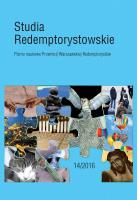Ignacy Radliński wobec idei postępu intelektualnego i moralnego
Ignacy Radliński towards the idea of intellectual and moral progress
Author(s): Piotr KoprowskiSubject(s): Philosophy, Ethics / Practical Philosophy
Published by: Warszawska Prowincja Redemptorystów
Keywords: intellectual progress; moral progress; positivism; modernism; society; intelligence;optimism;
Summary/Abstract: In the article a few reflection of the Polish historian, the specialist in religious studies and the thinker of Ignacy Radliński (1843–1920) was presented about understanding the idea of progress. Analysis of the artistic legacy is confirming Radliński in the belief that we are dealing with the erected thought above all on the basis of positivist concepts. In such a context one should perceive propagated ahead of the idea of progress. She is leaning on understanding progress as the sustained development, of driver to the better future. This vision has optimistic character. A faith in the learning as the guarantor of the progressiveness and a certainty constitute the base of the optimism, that the intellectual development and the appreciation of responsibility behind the society deprived of the own state, lying with the Polish educated person – authors, becoming a lever of dedicated activity. From the spirit of the positivism the concept was also erected enriched about other, new elements. Radliński, highlighting the role of the moral factor in deliberations above progress, of the free will and automatic awarenesses of the man, informed not only towards real reality, but also the transcendental sphere, pointing at the fact that he can make sovereign choices, bearing fruit with determined results both in the individual, as well as social dimension, occupied an opposing position towards the positivist theory of the determinism. Not belittling the weight and meaning of determined communities, he was under the charm of the creative presence of the individual in world. So he was closer in this aspect for rather thinkers of the XIX turning point and the 20th century than “classical” for positivists.
Journal: Studia Redemptorystowskie
- Issue Year: 2016
- Issue No: 14
- Page Range: 147-158
- Page Count: 12
- Language: Polish

